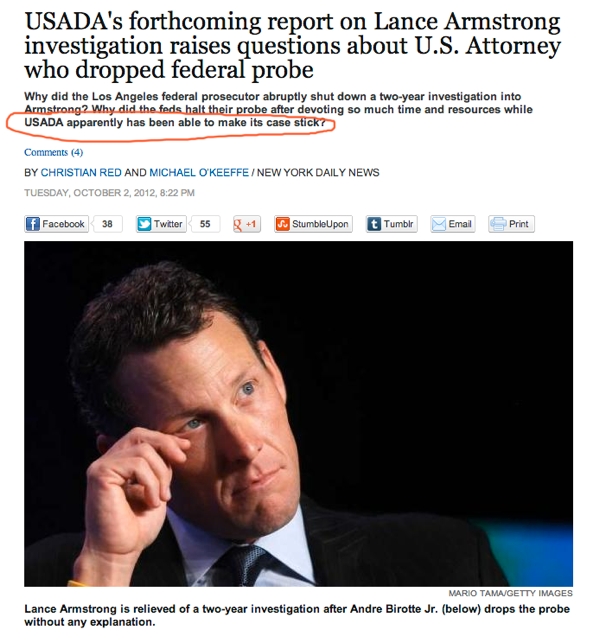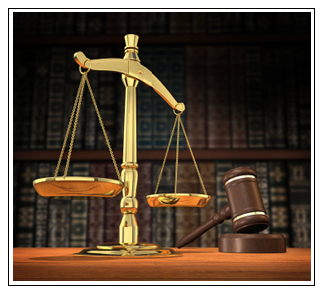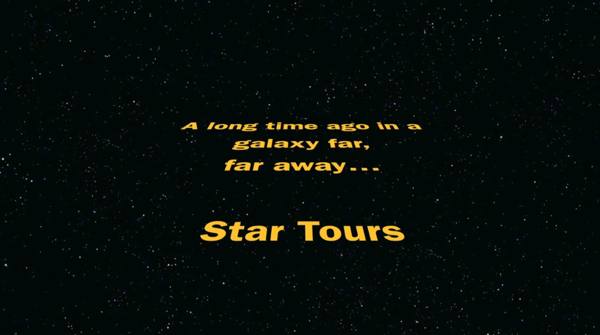Dan Kalbacher (@Sprintuer) is a blogger, cycling fan, neo-racer, and law enforcement official with a degree in Criminology, Law and Society. He brings a unique understanding of the Armstrong case to us in this op/ed piece.
His views are his own and do not necessarily represent his jurisdiction’s positions, strategies, or opinions.
You can read more of his writings by following him on twitter and on his blog.
* * * * *
For the past week I’ve been following a lot of chatter around social media leading up to the impending USADA release of their case against Lance Armstrong containing their reasoning to ban him for life and strip his results.
This kind of speculation is normal, and in all honesty I’m curious myself to see what the evidence is. However, I’m seeing increasing talk of “Why was the criminal investigation dropped?” or the “Federal prosecutors are going to look bad and have a lot of explaining to do” when everything comes out.
Looking at all this and also the fact that I’ve written about the criminal side of this subject before, I’ve come to realize I need to remind some people the key and very important differences that make the federal criminal case different from the USADA case against Lance which found him guilty of being a drug cheat. Some people aren’t going to like hearing this cold, hard truth, but in my line of work of law enforcement, the truth – though it can hurt sometimes – often makes this occupation difficult, but also tremendously rewarding.
The criminal investigation against Lance Armstrong was dropped. Yes, it was done very abruptly and suspiciously, even though it was the correct decision and one that rested exclusively on the federal prosecutor in charge of the case. Prosecutors make decisions every day that upset or aggravate their partners in law enforcement, and many times the logic and rational isn’t initially clear. In court, the prosecutor is the one responsible for trying the case and must answer to the judge presiding over the case once the case goes to trial.
The prosecutor, not the investigator is the one who has to prove the case to a jury of twelve beyond a reasonable doubt. Do prosecutors sometimes make the wrong decisions? Absolutely, they are human just like the investigators who gather the evidence, but we trust their decision-making and can’t second guess every decision they make because we don’t agree with it.
Given the extreme backlash that has followed the prosecutors since dropping the case, I strongly believe many people still would not be happy with any reasons they gave for dropping the case. Could political pressure have played a role in the decision? Absolutely, but it didn’t have to. It is hard to explain to people who already had their minds made up and who lack the specialized education and training in criminal law why you are doing something they do not agree with, or make them understand why certain decisions are made.
Now, let me go further into the more pressing issue here – outlining the daunting task prosecutors would have faced had the indictment against Lance Armstrong been made, a task which the USADA does not have to deal with when they bring cases against athletes.
Anyone who has practiced criminal law, studied it, or in my case brought criminal charges against individuals, knows that you only need probable cause to arrest an individual, but to obtain a conviction of guilty the government must prove their case beyond a reasonable doubt.
It’s easy to read a description of what “beyond a reasonable doubt” means, or watch a television courtroom drama talking about it, but it’s a whole different experience when you are doing it in real life (like I do). Criminal law places the entire burden upon the government to prove their case against the defendant, who in turn, has no responsibility to prove they didn’t do it or that they are in fact innocent. They are already viewed as innocent coming into the court (innocent until proven guilty).
It’s also a system with various safeguards in place in order to protect the rights of the accused, who is considered innocent until tried in a court of law, not the court of public opinion. Relating to the criminal charges, Lance Armstrong is innocent because he has yet to be proven guilty in a court of law, the only place it matters at the end of the day. Criminal law follows the principle that it is better to let many guilty persons go free than to have one innocent person suffer a wrongful verdict, and the courts will do everything to ensure adherence to a much higher burden of proof than in an anti-doping case.
The burden facing Lance at the USADA level is known as a “comfortable satisfaction,” which was changed years ago from “beyond a reasonable doubt” – a standard which is so significantly less stringent that it is almost laughable, and the reason why so many athletes are found in violation when charged. The significantly different standards of judgment between the two systems is the sole reason why the USADA had a much easier time “proving” their case against Lance Armstrong when compared to that of the federal prosecutors.
The most important thing to take away when reading the USADA report – that people may not recognize – is the fact that all the evidence in the USADA case against Lance is one-sided. Because Armstrong opted not to proceed with arbitration and enjoy “his day in court” so to speak, he was automatically determined to be at fault. Does that matter at the USADA level? No, absolutely not, and the rules are written such that when an athlete declines to contest the charges against him or her, this will be the end result.
However, we MUST remember that if federal prosecutors reopen the criminal case against Lance Armstrong (and I highly doubt they will), then every single piece of evidence used to find Lance guilty of doping by the USADA will be subjected to the most intense scrutiny and cross-examination by extremely smart and intelligent attorneys. (It is also important to note that Lance’s criminal defense team is probably the best in the country. They were significantly more prepared than those who represented him in his USADA case.)
So when everyone is talking about the massive loads of evidence pointing to Lance’s guilt in the USADA investigation, remember that none of it has withstood any scrutiny from Lance’s defense lawyers who would be zealously advocating in defense of their client before a court of law. That evidence will have to withstand massive cross examination that only needs to raise enough doubt to convince one jury that the government failed to meet their burden of proof.
It’s a lot harder to convince a jury of twelve men and women to agree on a verdict when there is a significantly higher burden of proof than it is to get two out of the three arbitrators to agree in an anti-doping arbitration hearing. If anyone disagrees with me, then they either have never been involved in a criminal case or they have and they don’t want to publicly acknowledge it. Even in jury trials where I think it’s a “slam dunk,” until that jury comes back and renders a guilty verdict there is always that lingering doubt of the unknown. There is no such thing as a “slam dunk” case in criminal law.
The “USADA was able to make their case ‘stick’ while the U.S. Attorney’s Office could not” headline was so incredibly misleading that it was the reason I decided to pen this Op-Ed. It’s just not that simple. The headline fails recognize the key differences between a case that federal prosecutors had to prove in a system protecting the accused against a powerful government with its vast resources versus a system under the USADA where the same protections do not apply.
It’s easy to make your case stick when it’s not challenged and subjected to intense scrutiny and cross examination when a person’s liberty and freedom are at stake. Whether or not the testimony given before the USADA and the federal grand jury was consistent does not make a bit of difference until it holds up to cross examination and other rules of evidence in a court of law. This is the cold, hard truth that faces prosecutors and law enforcement officials every single day. The dropping of the federal investigation helped propel the USADA into action in bringing a case against Lance Armstrong that federal prosecutors could not. It’s not the fault of prosecutors, as they’re under an intense burden, and rightly so. Lance could have potentially gone to prison as a federal felon, and our legal system wants to ensure that an innocent person is not punished, thus they will always err on the side of protecting the accused.
All citizens in this country are entitled to be treated equally and fairly under the law, even bullies and jerks like Lance, and nothing will ever change that. But because cheating in sports is not a crime, our legislature created the United States Anti-Doping Association to oversee activities that aren’t governed by the rules of law. As we’ve seen, proving these cases in a criminal court is difficult, as evidenced in the supposedly “slam dunk” cases against Roger Clemens and Barry Bonds, neither of which turned out well for federal prosecutors.
This does not discount the efforts made by Jeff Novitzky and his investigators in pursuing their cases, but when prosecutors feel the facts and evidence don’t hold up to proof beyond a reasonable doubt, they have a fiduciary and legal responsibility to drop the case. If you can objectively look at the differences between the federal criminal case and the USADA case, it is clearly evident that both cases turned out exactly how they should have. Doing to the right thing isn’t always going to make you popular, but we don’t go into law enforcement to be popular. Rather we do it to do the right thing even when it’s not popular.
















6 Comments
So you have a dozen sworn affidavits stating that “we all saw him inject and he boasted to everyone about having the UCI in his pocket” His wife and later girlfriend both admit under oath that they acted as couriers and helped him carry out transfusions. George W admits in court he pulled a few strings to help out a friend. Etc etc… Of course you can secure a conviction. The real point is that, like me, you don’t actually know what evidence the Feds had (and you won’t because they didn’t pass it on to USADA), so this entire article is utterly pointless conjecture. The frightening point this does highlight though is that the USA still hasn’t made doping illegal so it becomes necessary to use convoluted proxy charges that are always vulnerable. That’s a pretty sad state of affairs given that even the Spanish have been shamed into acknowledging that cheating in international sport is wrong. As for innocent until proven guilty – I can send you countless articles disputing that – funnily, mostly from last year – and in French.
Blokeinfrance Hi, thanks for taking the time to read my article. Your comment is actually the reason why I decided to write this article. The fact that you believe “Of course you can secure a conviction” is just demonstrates how little many people know about the American criminal legal system in America. How much of that evidence has held up against cross examination or other rules of law that it would have in an American courtroom that puts the highest prudence on protecting the accused? That’s right, none of it. I never said that I have any of the evidence used by the federal investigators and it doesn’t matter to this article. The main idea is that how much of this evidence has withstood the massive scrutiny it would face from probably the best criminal defense lawyers in the United States.
Every bit of evidence that has been used to “bully” Lance into not fighting against the USADA would have to convince a jury of Lance’s peers to all agree that he is guilty beyond a reasonable doubt of a federal crime. All of that evidence you mentioned opening your comment really doesn’t matter and most of it wouldn’t even be introduced into a court of law due to the various rules that protect defendants like Lance. Yes, I agree cheating in sport is wrong but in America it is NOT a crime nor will it ever be. Doping will NEVER be illegal because we would first have to making using narcotics illegal. There is no law in America that makes it illegal to “use” narcotics, anyone in custody for such offenses are arrested for “possession” or “distribution” but never because they “used” it without any evidence of possession or anything else. I know that is a very odd idea that “using” is not a crime but it isn’t here.
Sprintuer Blokeinfrance I was not aware that drug ‘use’ was not illegal in the US (i’m a Brit) – i thought that use, possession, distribution, manufacture etc of controlled substances would be – and whilst i guess what you say is correct at a federal level, maybe there are laws by state that deal specifically with use.
Also, would EPO ever be classified as a narcotic? I don’t think so. Is it on the yellow list?
One point i would re-iterate though is that nobody should ever try to relate the ‘laws’ associated with NGO’s such as USADA, to whom LA was definitely signed up to, with national laws – be they US, French or whatever….
@Sprintuer Your suggestion that Armstrong was somehow bullied into not contesting the charges laid against him by USADA is both bizarre and also revealing. As you have yourself pointed out, Armstrong can afford better lawyers than his accusers. It is difficult to see what he gains by refusing arbitration other than that he hopes to avoid the evidence against him being publicly aired, thus enabling him to maintain the fiction that he never failed a test and that the evidence consists of nothing more than hearsay from a handful of embittered rivals. I note that his publicists are already telling the media that there’s nothing new in the USADA file, despite the fact that Armstrong passed up the opportunity to find out what’s in it.
While your article is ostensibly a defense of the federal prosecutor’s decision to drop the case, one could be forgiven for thinking that your subtext is that if the charges wouldn’t stand up in a court of law then they are somehow invalid and Armstrong should be regarded as ‘innocent’. Are you here to defend the prosecutor, or to defend Armstrong? The vast majority of athletes who are banned for doping never go near a courtroom for the simple reason that the accusation is of cheating, not of criminality; of breaking the rules, not breaking the law. Innocent of a crime simply does not equate to innocent of being a dope cheat: would you have us believe Ben Johnson is innocent of doping because he was never prosecuted for it in court? Yet this is precisely the obfuscation you seem to be trying to pull here. This is only reinforced by your point that American law is particularly weak on translating offences against the rules of sport into offences in law. Armstrong may or may not be guilty of a federal crime by using banned substances, but he is most certainly guilty of using banned substances. That was shown beyond any reasonable doubt long ago, and Armstrong’s decision not to contest the charges may legitimately be regarded as an admission of guilt.
Your claim that doping will never be a crime in itself in America is also weak. Such legislation would indeed make ‘using’ substances an offence, but that would present no obvious bar to passing the legislation. ‘Using’ certain substances in certain contexts is already an offence – think using alcohol while driving on the public highway. But the putative crime would actually have more in common with criminal fraud than with drink-driving. For that reason, a doper could very likely be charged with a crime under English Law – when he or she signed his doping control forms and accepted prize money he’d be guilty of obtaining goods and services by deception. If French, Spanish, Italian or Flandrien law is equally robust, then Armstrong might be well-advised to avoid holidaying in Europe in future.
Thanks. This is well thought out and makes some excellent points. My father was a long time attorney who told me early on, “Never confuse justice with the law”
But I do think you dismiss the dismissal for political reasons too quickly. Not from a conspiracy perspective, but from the perspective that the Bond’s and Clemen’s cases created backlash from the voting public of, “So, why are we spending taxpayer money on pursuing these guys?” And that was for more ‘mainstream’ (in America) sport. Right or wrong, people just don’t care – and in an election year? I don’t dismiss that someone said, “Look, nothing good is going to come out of this. Some level of final justice might – but there will be a lot of collateral sound-bytes that make this an ugly situation” – just drop it.
Again – pure speculation, but I think it’s a credible guess at at least ‘part’ of the truth behind why the case was dropped.
Let us not reflect the double standard of justice in this country one for the rich and powerful and one for the marginalized and poor. It is rather an easy slam dunk to be found guilty before innocent if one is black, poor, muslim, latino, on and on.
We are discussing rich powerful and politically connected here. He has the phone numbers of several American presidents and the French president on his phone. Senators and Famous folks.
it is likely it was pulled politically. I say nonsense to this well meaning but wrong article. If this was so they would not have bothered with a two year investigation. And the entire team would not have been ready to proceed and only the one appointed overlord nixes it unilaterally without a discussion or review.
If it smells bad it is bad.